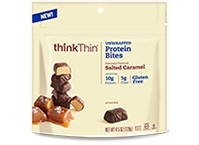Investment capital continues to chase protein plays, experts say

Glanbia’s acquisition of ThinkThin is the most recent deal to reach completion. The Irish dairy company with significant ingredient, finished goods and contract manufacturing operations in the US paid $217 million for the firm that specializes in protein bars. Grant Ferrier, a principal in Nutrition Capital Network, a company that tracks M&A activity as well as matches growth stage companies with investment capital, said the Glanbia deal is just one of a number that highlight this trend. Protein is big business, and getting bigger all the time.
“I think protein has been one of the biggest themes of the year. You see it in mainstream companies putting more protein into products. You see Cheerios with added protein, for example. And you are seeing protein used in a lot more formats. GoodBelly for example just came out with a new line of probiotic drinks with added protein,” Ferrier told NutraIngredients-USA.
Bountiful bars
Bars, which play across sports nutrition, weight management and on-the-go nutrition categories, continue to be a prime delivery mode for high doses of protein, Ferrier said. Even though the show floors of recent natural products trade gatherings have featured a dizzying array of new bar launches, Ferrier said there still seems to be room in the market for more, and that as these companies grow they continue to be attractive M&A targets.
“There is still a lot of activity in bars,” he said. “There are still companies coming out of the woodwork. Kind, for example, didn’t exist a decade ago. There is very low brand loyalty in the bar space.”
Among the significant deals in the past several years that illustrate the protein trend are these:
- Glanbia acquired ThinkThink for $217 million
- White Wave paid $550 million for Vega
- Post Holdings paid $400 million for PowerBar in 2014
- Hormel paid $450 for Cytosport
- Post acquired Dymatize Enterprises Inc./Supreme Protein for $380 million
- In 2013 Post bought Premier Nutrition Corp. for $180 million
- Also in 2013 Omega Protein acquired whey producer Wisconsin Specialty Protein in a private deal.
Glanbia’s recent strategy
Glanbia in addition bought whey protein producer Isopure for $153 million in 2013. This is part of Glanbia’s udder-to-shelf strategy for protein, as it had also earlier absorbed sports nutrition brand Optimum Nutrition, one of the leading whey protein sports brands.
“For Glanbia it is more of a start to finish story along the protein line. Their recent history to focus on every stage of the market,” Ferrier said.
Anthony Almada, a market watcher who also heads his own sports nutrition company called Vitargo, agreed that protein is the rock upon which Glanbia seems to be building out their company.
“For Glanbia, not unlike Hormel, These are companies that are protein-centric brands. Glanbia went from being a milk manufacturer to creating an entire chain around protein. Optimum is the larges consumer-facing whey protein brand in North America,” he said.
“I don’t think the trend is limited to sports nutrition. In the wider market there is a continued fascination with protein,” Almada said.
Ferrier said that while whey continues to rule the roost, the rise and fall of the price of the ingredient has pushed the market toward diversification. Whey is after all an ingredient whose raw material is a byproduct of cheese manufacture and so will always to some extent be tied to the vicissitudes of that market.
“From the supplier standpoint you see a lot of diversification away from just whey. There has been growth in plant-based proteins. But within the plant-based proteins you see diversification, too. A lot of the vegetable proteins such as pea and algae, they are all gaining market share. DuPont with its soy proteins isn’t losing sales but they are certainly losing market share,” Ferrier said.
Sustainability as an attractive investment
Ferrier also said that long term trends will support the growth of the plant protein pie, something that DuPont’s experts have also noted. So while the pieces within that pie might get redistributed, there will continue to be bigger pieces for everybody.
“A whole different side of the question is the broad realization that our culture has traditionally been focused on protein from animal sources. That has such a big impact on resources from a feed material, water use and climate change standpoint. If we end up with more than 8 billion people on the planet, and we extend that out with another billion or so people ascending to a middle class condition, how are we going to feed all those people?” he said.
Ferrier said that underlying trend will push investments into meat substitute products. It’s an attractive place for tech investors to be, and it’s not just about enabling a vegetarian to eat something that looks like a hamburger.
“This will be a good fit for the traditional science investor, the traditional biotech investor who doesn’t want all of their money going into drug discovery. These investors are coming to protein basically through the high tech aspect. They are looking at products that have more of a future, that aren’t tied to an unsustainable supply chain,” Ferrier said.























